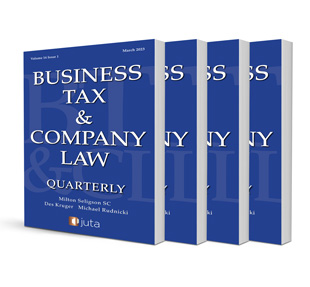
The Enviroserv Case: A Shift in Interpretation of What is a Process of Manufacture
Author: Michael Rudnicki
ISSN: 2219-1585
Affiliations: Tax Executive, Bowman’s Attorneys, Johannesburg
Source: Business Tax & Company Law Quarterly, Volume 15 Issue 2, 2024, p. 24 – 30
Abstract
This article explores the case of Enviroserv Waste Management (Pty) Limited v the Commissioner for the South African Revenue Service in relation to the facts,
the outcome and the principles developed therein. The case focuses on the business of waste management services conducted by Enviroserv and whether the decomposition and biodegradation of waste in the cells within a landfill site constitute a process of manufacture or a similar process. The article considers the objective transformation of the input into the process as considered in some of the older court decisions. In those decisions the court argued that an article must be ‘essentially different’ from the article that existed before it had undergone the process. The more recent cases focus on the nature, form, shape or utility of the article and that a non-physical transformation could also be an essential difference in a product. The disputed issue related to whether the process that took place in the cells constituted plant used directly in a process of manufacture or a similar process, as contemplated in section 12C of the Income Tax Act, 1962 (‘the Act’). SARS argued that the cells are a storage facility, and that leachate is a byproduct of the waste disposal process. The Commissioner further argued that the cells are buildings and not plant. The provisions of section 12C do not apply to buildings. Section 12C provides a taxpayer a deduction of 20% per annum of the cost of machinery or plant, owned by the taxpayer and used directly in a process of manufacture or a similar process. The court considered the meanings of ‘process’ and ‘manufacture’, which are not defined in the Act from various precedent, to be something made which is different from that out of which it is made. The court held that the process undertaken by Enviroserv constituted a process of separation of the leachate from the solid waste. SARS argued that the cells are ‘waste disposal assets’, defined in section 37B of the Act, are not ‘plant’ as defined in section 12C and are akin to dumps or reservoirs contemplated in the section. Defining features of section 37B are that assets are used in a process that is ancillary to a process of manufacture and are required by environmental law. The provisions of section 12C do not have such requirement. The court also did not find it necessary to consider whether the structure was permanent. The focus was on the process undertaken inside the cell and that this process was intended and desired by the taxpayer within its manufacturing process and therefore not ancillary thereto.